After 100 days of protests from students against a planed tuition fees, and after passing Bill 78, a specific emergency law designed to curb the excesses of the protest (even though polls show that two-thirds of Québec residents are in favor of the government’s position and not the students), with The Globe and Mail quoting signs that read “Québec is becoming a dictatorship,” and with oddsmakers giving military rule in Québec only 5.5:1 odds, well, it might be a sign that Jean Charest’s longtime government may be coming to a denouement.![]()
![]()
It’s stunning to think that the leader of a party that was a precursor to Stephen Harper’s Conservative Party has been the premier of the traditionally more progressive, statist Québec for nearly a decade.
Charest was the leader of the Progressive Conservative party from 1993 to 1998, when it held anywhere from two to 20 seats in the House of Commons, and long before its assimilation into the Canadian Alliance, and Harper’s conservative majority. (Remember that in Canada, provincial parties are not merely extensions of federal parties, even if they share the same name: in the April Albertan election, for example, many federal Conservatives supported not the Progressive Conservatives, but the Wildrose party.)
Yet, Jean Charest has been running Québec’s government since 2003, and he has headed Québec’s Liberal Party since 1998, all without ever becoming terribly popular — and indeed, Charest has spent most of his time as Québec’s premier fairly unpopular — for the better part of a decade, it’s been Québec’s uncannily undead government.
But in the fight over student tuition fees, as a potentially explosive corruption inquiry also gets underway this week, Charest may have found his Waterloo.
Charest, in his nine years, has kept his main opposition, the sovereignist, left-leaning Parti Québécois, at bay: first, Bernard Landry, the protégé of separatist Jacques Parizeau, who came within 1% of declaring Québec’s independence in the 1995 referendum; then, the PQ’s party boy André Boisclair, the openly gay, not-quite-ready-for-prime-time leader who led the PQ to a disastrous result in the 2007 election; and now — so far — Pauline Marois, the PQ’s leader since 2007.
Charest has also weathered the rise (and fall) of Mario Dumont, whose Action démocratique du Québec rose to prominence, somewhat with Harper’s backing, as Québec legislature’s official opposition in 2007, only to fall back at the next election in 2008 to minor party status.
Indeed, it looks like Charest may also see off François Legault and his newly formed Coalition avenir Québec, which has always felt like a kind of repackaged successor to Dumont’s ADQ — a vaguely “have it both ways” soft-sovereignist, pro-market-up-to-a-point political movement.
As ThreeHundredEight shows, the Liberals and the PQ are currently tied, essentially, among voters today, with the CAQ falling back quite a bit to third place.
But to see polls show that Charest, if he called an election tomorrow, would still be even (even!) to remain premier, at worst, is a testament to his zombie-like political prowess.
Charest, who was rumored to be considering a spring election this year, must call an election by the end of 2013.
The most recent catalyst for the student tuition protest drama was the decision, last Monday, by top Charest adviser and education minister Line Beauchamp, to retire from politics, stating that she had lost confidence in the ability of student leaders to end the conflict with the Québec government over tuition fees. It was a stinging defeat for Charest to see such a close comrade, essentially, admitting defeat some 15 weeks into a battle with Montréal student protesters.
But in pushing Bill 78 through Quebec’s legislature late last Thursday night– among other things, the bill, which expires July 1, 2013, makes any gatherings of over 50 people illegal unless they tell police in advance the start time, finish time and route of such gathering — Charest has passed emergency legislation that scholars believe to be appalling from a constitutional and human rights standpoint:
“Read it. Stunned. Can’t believe that a democratic government can adopt such a law,” tweeted law professor Louis-Philippe Lampron, a Laval University expert in human rights.
Students are protesting a $1,625 increase in tuition over the next seven years (Charest, in April, offered extended the increase period from a proposed five years). Although the tuition hike represents a 75% increase for Québec’s students, they would still pay far less than students in other Canadian provinces, and it is akin to the annual tuition hikes across U.S. universities that American students routinely accept (although student loans spiraled beyond credit card debt as the largest source of private U.S. debt last year). The protests began in February, but they appeared to have crested with a March 22 rally — until now.
Furthermore, amid the international approbation over Charest’s handling of the protests comes a new challenge — an inquiry into corruption in the province that could prove highly embarrassing for Charest’s Liberals. A similar inquiry, the Gomery Commission, released reports in 2005 and 2006 that were fatal to Paul Martin’s federal Liberal government and, indeed, led to massive unpopularity in Québec especially, in light of the Liberal sponsorship scandal, which exposed corrupt efforts to boost federalist programs in Québec.
The Québec-focused corruption inquiry must make its report by October 2013 — right before the last possible date for an early election in the province.
Students taunting the Liberal government in street protests with no end in sight, a commission investigating the government behind closed doors, and seemingly everyone else within and beyond Québec outraged over the overreaction of Bill 78.
Tricky days, these, for Jean Charest.
Special thanks to Giancarlo Di Pietro, Esq. for his invaluable guidance on this post.


I think the admin of this web page is genuinely working
hard for his web page, since here every information is quality based
material.